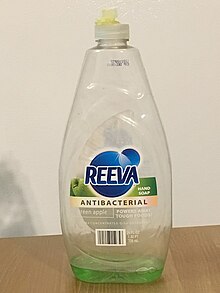
Antibacterial soap is a soap which contains chemical ingredients that purportedly assist in killing bacteria. The majority of antibacterial soaps contain triclosan, though other chemical additives are also common. The effectiveness of products branded as being antibacterial has been disputed by some academics as well as the U.S. Food and Drug Administration (FDA).
History
The earliest antibacterial soap was carbolic soap, which used up to 5% phenols (carbolic acid). Fears about the safety of carbolic soaps chemical components on the skin brought about a ban on some of these chemical components.Triclosan and other antibacterial agents have long been used in commercial cleaning products for hospitals and other healthcare settings, however they began to be used in home cleaning products during the 1990s.
Ingredients
Triclosan and triclocarban are the most common compounds used as antibacterials in soaps. However, other common antibacterial ingredients in soaps include benzalkonium chloride, benzethonium chloride, and chloroxylenol.
Effectiveness
Claims that antibacterial soap is effective stem from the long-standing knowledge that triclosan can inhibit the growth of various bacteria, as well as some fungi. However, more recent reviews have suggested that antibacterial soaps are no better than regular soaps at preventing illness or reducing bacteria on the hands of users.
In September 2016, the U.S. Food and Drug Administration banned the use of the common antibacterial ingredients triclosan and triclocarban, and 17 other ingredients frequently used in "antibacterial" soaps and washes, due to insufficient information on the long-term health effects of their use and a lack of evidence on their effectiveness. The FDA stated "There is no data demonstrating that over-the-counter antibacterial soaps are better at preventing illness than washing with plain soap and water". The agency also asserted that despite requests for such information, the FDA did not receive sufficient data from manufacturers on the long-term health effects of these chemicals. This ban does not apply to hand sanitizer. This is due to the fact that hand sanitizer typically utilizes alcohol to kill microbes rather than triclosan or similar ingredients.
A 2017 statement by 200 scientists and medics published in the scientific journal Environmental Health Perspectives warns that anti-bacterial soaps and gels are useless and may cause harm. The statement also cautioned against the use of antimicrobial agents in food contact materials, textiles, and paints. British firm Unilever claimed in 2017 to be phasing triclosan and triclocarban out of their products by the end of the year, adding they would be replaced by “a range of alternatives, including natural and nature-inspired antibacterial ingredients”.
Claims have been made in the media that antibacterial soap is more effective than plain soap in the prevention of the SARS-CoV-2 virus. The CDC and the Food and Drug Administration both recommend plain soap; there is no evidence that antibacterial soaps are any better, and limited evidence that they might be worse long-term.
See also
References
- "FDA Taking Closer Look at 'Antibacterial' Soap". U.S. Food and Drug Administration. Retrieved 16 April 2016.
- ^ Aiello AE, Larson EL, Levy SB (September 2007). "Consumer Antibacterial Soaps: Effective or Just Risky?" (PDF). Clinical Infectious Diseases. 45 (2): S137-47. doi:10.1086/519255. PMID 17683018.
- ^ "Five Reasons Why You Should Probably Stop Using Antibacterial Soap". Smithsonian Magazine. 3 January 2014. Retrieved 3 September 2016.
- Oboh IO, Aluyor EO (2011). "A comparative study of a local plant extract as a possible potential medicated agent in the soap industry". Global Journal of Pure and Applied Sciences. 17 (3): 345–348. ISSN 1118-0579.
- ^ "FDA bans common ingredients in antibacterial soaps and body washes". Washington Post. 2 September 2016. Retrieved 3 September 2016.
- ^ Kodjak A (2 September 2016). "FDA Bans 19 Chemicals Used In Antibacterial Soaps". NPR. Retrieved 24 October 2017.
- "Antibacterial Soap? You Can Skip It, Use Plan Soap and Water". US FDA. Retrieved 24 October 2017.
- ^ Halden RU, Lindeman AE, Aiello AE, Andrews D, Arnold WA, Fair P, Fuoco RE, Geer LA, Johnson PI, Lohmann R, McNeill K, Sacks VP, Schettler T, Weber R, Zoeller RT, Blum A (June 2017). "The Florence Statement on Triclosan and Triclocarban". Environ Health Perspect. 125 (6): 064501. doi:10.1289/EHP1788. PMC 5644973. PMID 28632490.
- Muanya C (27 June 2017). "Antibacterial soaps may do more harm than good". The Guardian. Retrieved 3 August 2022.
- Center for Drug Evaluation and Research (13 April 2020). "Q&A for Consumers: Hand Sanitizers and COVID-19". FDA.